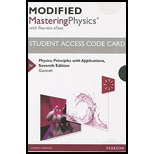Physics
PHYS 2350, 2360
Fall 2025
Required Textbooks:
-
 Mastering Physics with Pearson eText
by
Call Number: AVAILABLE FOR PURCHASE ONLINEISBN: 8220144725160
Mastering Physics with Pearson eText
by
Call Number: AVAILABLE FOR PURCHASE ONLINEISBN: 8220144725160 -
Physics (1 Semester) Connect Access by
Call Number: AVAILABLE FOR PURCHASE ONLINEISBN: 8220123782108
- Use the basic concepts of mechanics, such as energy, momentum, force, torque, and wave motion to solve simple mechanical problems.
- Use the basic concepts of fluid mechanics, including pressure, density, and volume flow to solve fluid problems.
- Apply thermodynamic concepts such as heat, internal energy, temperature, thermal conduction, and entropy to thermodynamic problems, especially to problems involving ideal gases.
- Calculate electric and magnetic fields, forces, and potentials from a given set of charges or currents.
- Use the basic properties of electromagnetic waves and how they relate to optics to solve related, simple problems.
- Solve electric circuit problems for both AC and DC circuits containing batteries, inductors, capacitors, and resistors.
- Use the basic ideas of geometrical and physical optics, such as refraction and diffraction to solve simple optical problems.
- Solve simple problems in special relativity involving energy, momentum, length contraction, time dilation, and velocity composition.
- Apply elementary ideas from quantum mechanics to simple systems such as the hydrogen atom.
Library Quick Search
Search our library resources by selecting an option below:
 Search Full Text Finder to find the full text of a publication.
Search Full Text Finder to find the full text of a publication.
If you see an embargo next to a e-journal title: An embargo period is a period of time which an official academic publication is not yet available online, either due to publishing restrictions or subscription contracts. Ex: "Embargo: 1 Year" = access begins one year ago from today's date.
If you have the DOI of an article, you can search for the article using DOI Tools.

|
Databases: search for articles, datasets, and videos on your topic |
|
|
View Databases by Subject OR All Databases |
|
 Search NSUWorks - NSU's Institutional Repository:
Search NSUWorks - NSU's Institutional Repository:
Browse or search scholarship in Digital Commons @ NSUWorks!

Find research tips, useful resources, and more by searching our LibGuides or browsing the topics below:
Oceanographic Campus Library Guides | Writing & Citation Style | Course Guides | Browse by Subject | How-To Guides | LibraryLearn : Short Video Tutorials | Razor's Research Bytes |

NSU Oceanographic Campus Library, 8000 North Ocean Drive, Dania Beach, Florida 33004
(954) 262-3699 | oclibrary@nova.edu | Hours | NSU Libraries